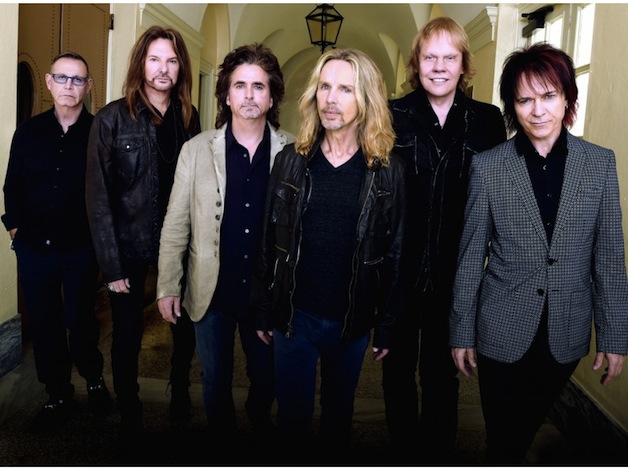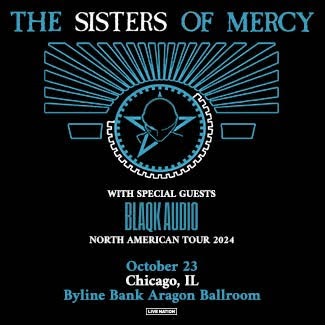IE Rewind: Styx
Before “Smells Like Teen Spirit” became a decade-defining anthem, a particularly shimmery form of hard rock – not alternative rock – was the sound of the 1990s. Slaughter, Damn Yankees, and “Cherry Pie” dominated FM airwaves in 1990, and the last blasts of the Aqua Net ’80s would stand tall and crisp until the wisdom of Pearl Jam and Nirvana shamed rockers into buying new collections on the promise of 1991’s Ten and Nevermind.
Nestled in that sticky-sweet class of ’90 was a newly relaunched Styx, whose Edge Of The Century compact disc married the day’s neon hooks with an uplifting brand of pomp that sold countless millions through the 1970s and early ’80s. It was the last Styx studio album to appear on a major label, but judging from the pop-metal blitz still sacking MTV deep into ’91 (Firehouse, Extreme) and even ’92 (Saigon Kick), the glammy version of Styx (with Dennis DeYoung calling the shots while splitting lead vocals with nasal newbie Glen Burtnik) ducked out a bit too soon.
Styx appears June 24 at Taste Of Joliet: Tickets available HERE
A&M dropped Styx after Edge Of The Century ran its course “because the artists were asking to renew their contract and asking for a ridiculous amount of money,” says lead guitarist/vocalist James “J.Y.” Young, chuckling in Tulsa, Okla., before one of the Chicago band’s estimated 110 concerts per year. Young and original bassist Chuck Panozzo (who now works part-time) are the only members in the current lineup who played on Edge (drummer John Panozzo died in ’96; Burtnik left in ’03; and Young hasn’t spoken with DeYoung since ’99). “They would have given us, say, a Brian Urlacher deal, but Urlacher didn’t want that deal. So they just let him go,” he continues. “That’s kind of what happened for us. And I believe that the people we chose to represent us actually had another deal that they were negotiating at the same time with A&M that didn’t go the way A&M liked, so they sort of punished our representative by letting us go. But we were asking for an awful lot.”
The Edge reunion notably lacked lead vocalist/guitarist Tommy Shaw, who, at the time, was harmonizing his way up the charts in his Damn Yankees supergroup with Ted Nugent and Jack Blades of Night Ranger. Shaw is back in Styx these days as the tour heads through the Plains states with the Motor City Madman himself. Young bristles playfully at the subject of Damn Yankees. Styx’s hardest-rocking original member says if the pop-metal years had gone the way he and Shaw were once discussing, Burtnik wouldn’t have been brought in at all. Damn Yankees, he argues, should have never been born.
“What happened in the late ’80s is that we had broken up in ’83 [after the successful, but divisive Kilroy Was Here], and the Panozzo brothers and myself were trying to get the band back together. Tommy was interested in getting the band back together, but Dennis,” he hesitates, “Dennis didn’t even want to talk about it. And Tommy had already made three solo records, and he was interested in and needed to get out and do his next project . . . Tommy got fed up with waiting for Dennis. They put him in a room with Nugent and Jack Blades, and they were starting to generate a little heat. And ultimately, Tommy made a commitment to a man with loaded firearms and a crossbow [laughs]. And then Dennis’ third [solo] album came out and flopped, so he wanted Tommy to come back, but Tommy had already committed.”
Besides, “Damn Yankees was probably even softer than I would have gone,” the South Sider behind the sizzling, sneering “Miss America” adds. *Edge’s* biggest hit came from a DeYoung ballad that appeared on the album as the churchgoing cousin to the previous lineup’s simple “Babe” (which, according to “Behind The Music,” Damn Yankees had been mocking onstage with Shaw feigning its familar intro and Nugent then smashing Shaw’s guitar). During the Gulf War, radio played an unofficial “Show Me The Way” overdubbed with political and military leaders comparing Saddam Hussein to Adolf Hitler, a child begging for her father, and shout-outs to various members of the armed forces in Saudi Arabia. Young acknowledges the Desert Storm mix wasn’t the group’s idea, but “it really resonated, and this was a way to let people connect with their feelings about what was going on around them,” so an official version was created. “I think it’s one of Dennis’ best songs,” he concedes.
Young knows that when Styx takes the stage, the fans before him will have crossed one hell of a river. At age 63, he has witnessed what they’ve endured: indignities, losses, wars. There’s a heaviness amplifying each performance having little to do with metal – a heaviness doomed to repeat, it seems. Times change, members change, but it’s through their voices that dusty psalms move.
“‘Man In The Wilderness’ is very much about Tommy’s older brother’s experience in the Vietnam War. When he wrote it, we were out of Vietnam and it was what it was,” he shares. “We all thought there would never be another war because that one was just so horrible and so misplaced in terms of its intent. But unfortunately, 30 years later, a song like ‘Blue Collar Man,’ a song like ‘Pieces Of Eight,’ a song like ‘Man In The Wilderness’ are completely and sadly, profoundly relevant at this moment in time again.”
Today Styx leans heavily on songs from 1977’s The Grand Illusion and 1978’s Pieces Of Eight, and last month released a stand-alone double CD of The Grand Illusion/Pieces Of Eight Live (Eagle Rock). The set presents the current lineup – including the DeYoung-like Lawrence Gowan and drummer Todd Sucherman – performing the multiplatinum LPs live. The same recording arrived last year on DVD and Blu-ray and is one of several live Styx albums released in the years since A&M. It’s one live album too many, Young suggests.
“I was completely against ever releasing it,” he says with a laugh, referring specifically to the double CD, which reveals the autumn in his voice. “How many live CDs have we done? You probably know . . . I mean, the DVD to me is the essence of the whole thing. There was such a strong emphasis on the great visuals that we had. Plus, we did both albums in their entirety and some songs that we’d never performed before, and some songs that we hadn’t performed in 30 years, probably. And I felt like you might mix it a little bit differently [for a CD release].”
How about a new studio album, then? “Maybe . . . I look at our colleagues in arms: Heart, who is just being inducted into the Rock and Roll Hall of Fame. Rush. I talk about Journey. I talk about Foreigner, Boston, Kansas. A lot of these people have made new records in the last five years, and if you could name me one song [from the new material], I’d be surprised. If you heard them on the radio, I’d be surprised. And there’s just really no reason – that’s an old-style thing, to create an album of material.”
“We’re heading for the end of something,” the band sang on the title track of Edge in 1990. What’s changed?
Reprinted and reposted from June, 2013 by Mike Meyer











